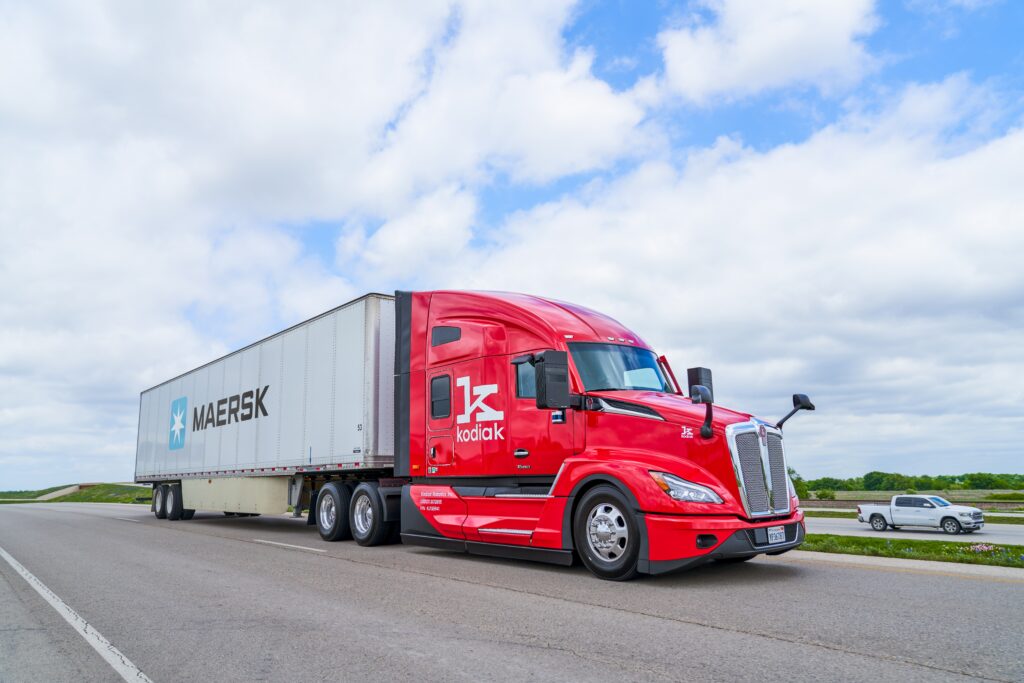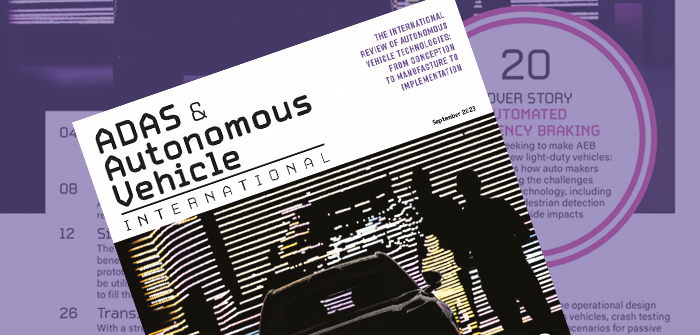The first commercial autonomous trucking route between Houston, Texas, and Oklahoma City, Oklahoma, has opened, with autonomous trucks from Kodiak delivering goods on behalf of A.P. Moller – Maersk (Maersk).
A ‘lane’ is a US trucking industry term for a route, explained Michael Wiesinger, VP of commercialization at Kodiak Robotics: “Any vehicle can therefore theoretically drive on the same lane, though Kodiak is the only autonomous trucking company that is running between Houston and Oklahoma City.”
As such, Kodiak’s trucks are not restricted to a single lane: “They generally stay in the right lane, but are able to switch lanes as necessary to allow for merges or to give additional room to vehicles parked on the shoulder,” continued Wiesinger. “They have no special markings, other than the big Kodiak K on the side of the truck.”
He added that Kodiak is currently the only self-driving trucking company offering routine service in Oklahoma and is the only on-road autonomous company partnering with Maersk. “Kodiak’s unique lightweight mapping solution allows the company to onboard and operate new lanes quickly.”
The company also confirmed that no modifications were required to the highway: “Kodiak has designed its system to be able to operate using today’s infrastructure, so it is not dependent on V2X solutions but will be able to integrate V2X information when it becomes available,” Wiesinger told ADAS & Autonomous Vehicle International.
Safety driver on board – for now
The freight lane is the latest manifestation of the collaboration between the two companies, which began with their first autonomous freight deliveries together in November 2022 as part of Maersk’s Global Innovation Center Program. Kodiak has been delivering eight loads per week, with a safety driver behind the wheel, for Maersk customers since August.
“In general, we plan to begin driverless operations [no safety driver on board] when we have completed our safety case – our comprehensive demonstration that our system is safer than the average human truck driver,” said Wiesinger. “We anticipate our first driverless runs by the end of next year. Current legislation in Texas and 22 other US states allow for driverless vehicle deployment, as long as the vehicle can comply with the rules of the road. As such, no additional legislation or permitting is required before Kodiak can begin driverless deliveries in Texas and Oklahoma. We have also worked closely with the Texas Department of Transportation and Texas Department of Public Safety during our operations in Texas.”
Supply chain learning
These commercial operations are helping to deepen Maersk and Kodiak’s expertise in integrating autonomous technology into supply chain networks.
“Teaming with Kodiak enables Maersk to stay at the forefront of innovative solutions,” said Erez Agmoni, Maersk’s global head of innovation – logistics and services. “Autonomous trucks will play an instrumental role in digitizing the supply chain. We expect self-driving trucks to ultimately become a competitive advantage for Maersk as we execute on our strategy to provide customers with a sustainable, end-to-end logistics solution across air, land and sea.”
Kodiak and Maersk are completing four round trips per week on a 24-hour-a-day, four-day-a-week basis between a Houston facility, where consumer products are loaded onto 16m trailers, to a distribution center in Oklahoma City. Operational learnings gained from the activity are captured and documented as part of the Kodiak Partner Deployment Program, which is designed to help companies learn how Kodiak’s self-driving trucks can become an integral part of their overall logistics strategy and offerings.
“Since our founding, we have focused on developing an autonomous product that is easy for global innovation leaders to integrate into their networks, and Maersk is a perfect fit,” said Don Burnette, founder and CEO of Kodiak. “Hauling commercial freight gives us the opportunity to work together to integrate Kodiak’s autonomous trucking solution into Maersk’s operations. As the first autonomous trucking company to establish this new commercial lane between Houston and Oklahoma City, we are demonstrating our team’s ability to introduce new lanes and bring new efficiencies to the entire logistics industry.”
Business case
Autonomous trucking solutions have the potential to address long-term challenges faced by the trucking industry. According to the American Trucking Association (ATA), the trucking industry faces a shortage of roughly 78,000 drivers. The organization estimates that, based on current driver demographic trends, as well as projected growth in freight demand, the shortage could swell to more than 160,000 over the next decade.
Safety continues to be a perennial challenge for the trucking industry as well. US National Highway Traffic Safety Administration (NHTSA) research estimates that 94% of crashes occur due to human error. For Kodiak, safety and performance are foundational to its autonomous trucking solution. Each vehicle is equipped with 18 sensors, including cameras, radar and lidar, that provide the platform with a 360° view around the truck. Every tenth of a second, the truck evaluates the performance of more than 1,000 safety-critical processes and components in the self-driving stack and the underlying truck platform. The trucks learn in parallel, with system upgrades shared to the entire fleet simultaneously, and are not subject to environmental distractions.
Maersk and Kodiak will continue to explore future avenues for collaboration across Maersk’s growing North American logistics network.
Interested in autonomous trucks? Read our feature on the market outlook for the autonomous trucking sector, in the September 2023 issue.



